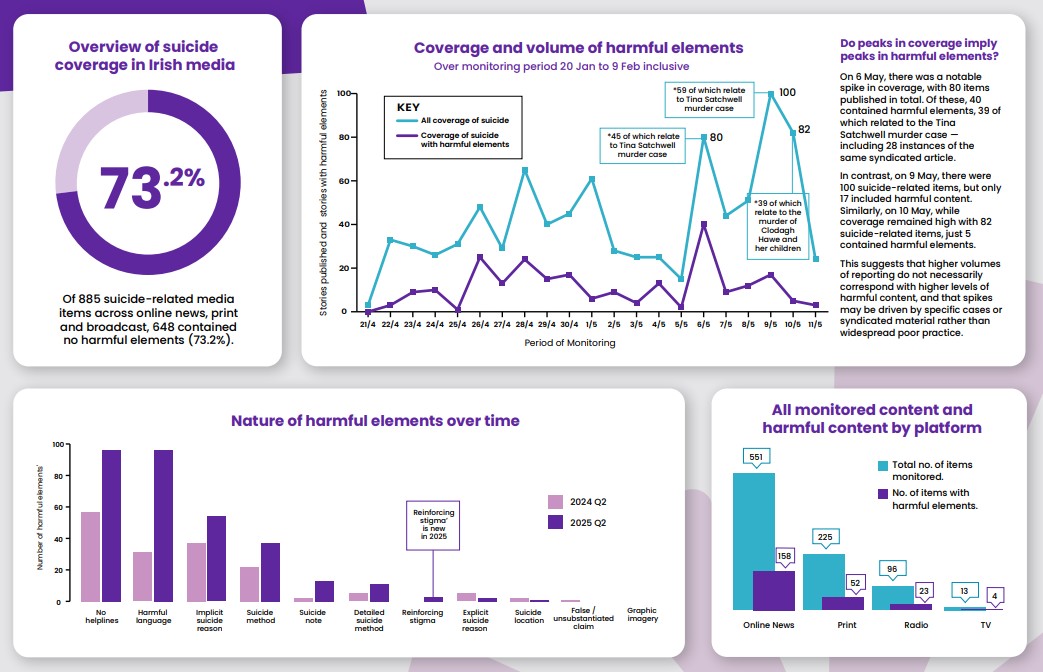Media Monitoring and Information

Shine’s Media Monitoring
Data-Driven Insights for Safer Media Practices
Funded through the National Office for Suicide Prevention, our media monitoring can offer journalists evidence-based insights to support them in telling important and complex mental health stories. Using existing guidelines on suicide reporting, we analyse 1000s of suicide-related reports across print, online and broadcast news media. We share these insights to support media professionals in preventing imitative suicides and support audiences at risk of suicide. Download our latest reports below.
While a large majority of content in Q2 2025 (73.2%) contained no harmful elements, there was a sharp decrease from earlier quarters (80.2% and 80.4% in the two preceding quarters). This reduction was driven largely by two high-volume, high-profile stories that dominated the monitoring period: the Tina Satchwell murder trial and the death of Virginia Giuffre.

- A lack of helplines continues to be the most concerning issue
- There is a strong reliance on online news platforms for suicide coverage.
- Stories about bullying was the most common story type where harmful elements were found.
- Responsible reporting occurs in a large majority of stories related to suicide.
Understanding how media portrays mental health and suicide is essential for improving public discourse and reducing harm. Our media monitoring methodology is designed to identify trends, highlight areas for improvement, and support journalists in producing ethical, responsible reporting.
Comprehensive Data Collection
We track print, online, and news and broadcast factual media, ensuring a broad and representative sample of national and regional reporting on mental health and suicide for a 3-week period every quarter.
Coding & Categorisation
Media items are assessed using a refined coding framework that identifies:
- Harmful elements associated with increased risk of suicide to audiences
- Who is reporting these elements, in what format, and where
- The context or theme of reporting
- Stigmatising language
- When they are necessary, the inclusion of helplines
- Inclusion of lived experience
Trend Analysis & Reporting
By analysing data over time, we detect shifts in reporting patterns, emerging risks, and areas where progress is being made. These insights shape our quarterly reports, helping media professionals and policymakers make informed decisions on suicide-reporting practices.
Collaborative Learning & Adaptation
Our methodology evolves in response to new research, real-world media trends, and feedback from journalists, mental health experts, and the wider community. We use real world examples observed in our media monitoring throughout our workshops. If there is an element of suicide-reporting that you would like us to track, or you would like to avail of a free workshop on implementing these guidelines, please get in touch.
We currently track suicide-related content from:

Shine’s Media Monitoring
Data-Driven Insights for Safer Media Practices
Funded through the National Office for Suicide Prevention, our media monitoring can offer journalists evidence-based insights to support them in telling important and complex mental health stories. Using existing guidelines on suicide reporting, we analyse 1000s of suicide-related reports across print, online and broadcast news media. We share these insights to support media professionals in preventing imitative suicides and support audiences at risk of suicide. Download our latest reports below.

In 2021, just 2% of media items referencing some mental illnesses included the perspective of someone living with that experience* . Share this quick reference checklist with potential contributors who have experience of trauma or mental illness. Clear communication and managing expectations are crucially important to creating a trauma-informed space for both you and your contributors.
The Samaritans have been guiding the media on the responsible reporting of suicide for decades. Visit their website for specific guidance on issues related to reporting on youth suicides, suicide clusters, inquest reporting, and more.
Reporters, photographers, videographers, designers, and other news staff may undergo traumatic stress during any news event whether they are at the scene or behind the desk. It’s important to have specific self-care practices in place to help your staff during these difficult moments.
Click here for the tipsheet.
Resources
If you’re looking for resources to help you, your contributor or your audience, you may find these helpful:

The Rosalynn Carter Fellowship for Mental Health Journalism in Ireland
Founded in 1996, the highly competitive Rosalynn Carter Fellowship for Mental Health Journalism awards year long, non-residential fellowships to journalists from the United States, Colombia, Qatar, and the United Arab Emirates to report on a mental health topic of their choice. In 2023, Shine’s Headline programme, in partnership with the Carter Center, proudly announced the rollout of this prestigious fellowship in Ireland through the Rosalynn Carter Fellowship for Mental Health Journalism in the Republic of Ireland.
Find out more
Mental Health Media Awards
Shine works closely with the media to promote responsible and accurate reporting on mental health. Through guidance, training, and collaboration, Shine helps journalists and media professionals understand the impact of stigma and misinformation while encouraging coverage that is respectful and informed.
Find out more
Green Ribbon Order Form
To order your FREE Green Ribbons, please fill out this form with your order details:









